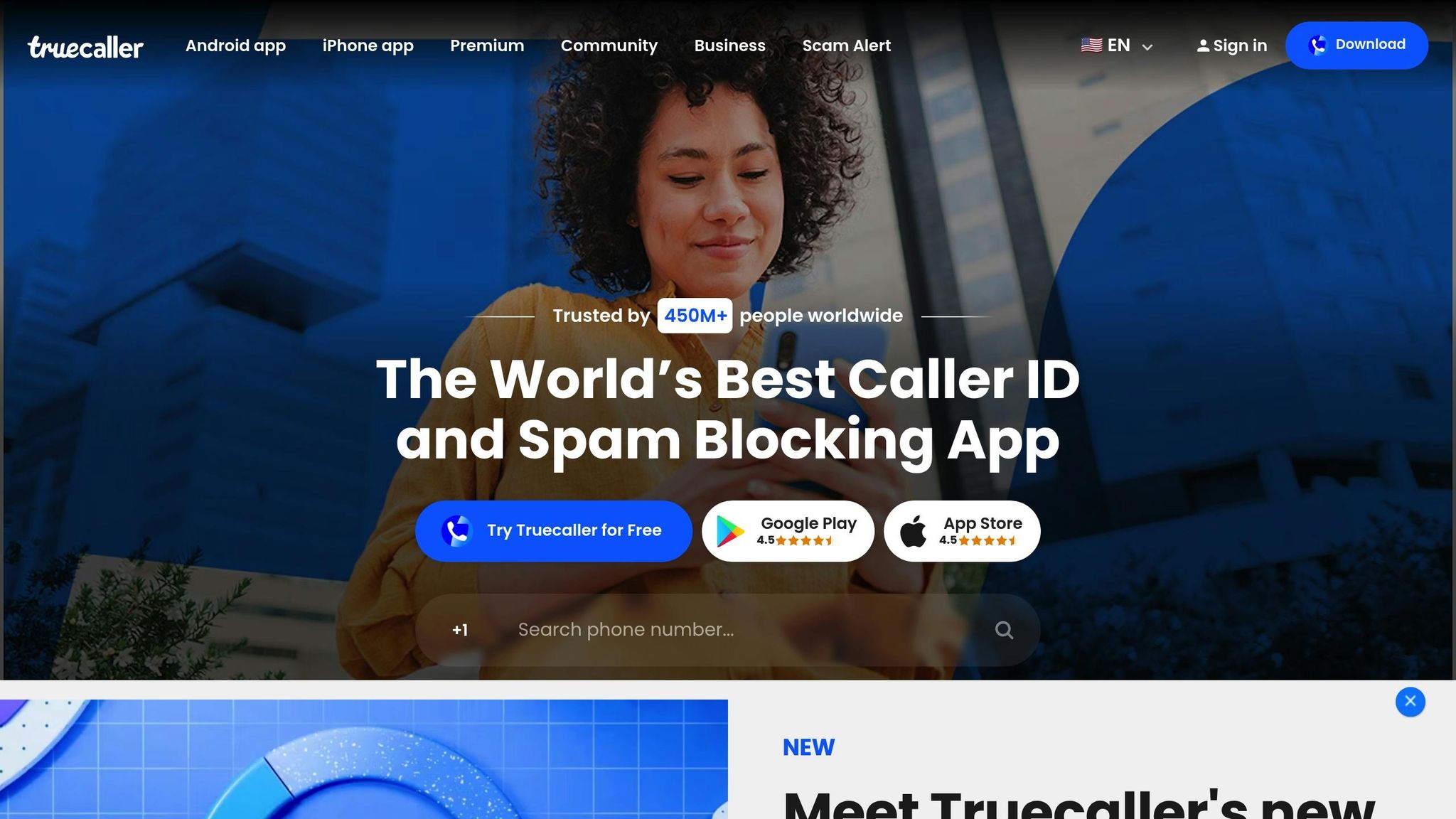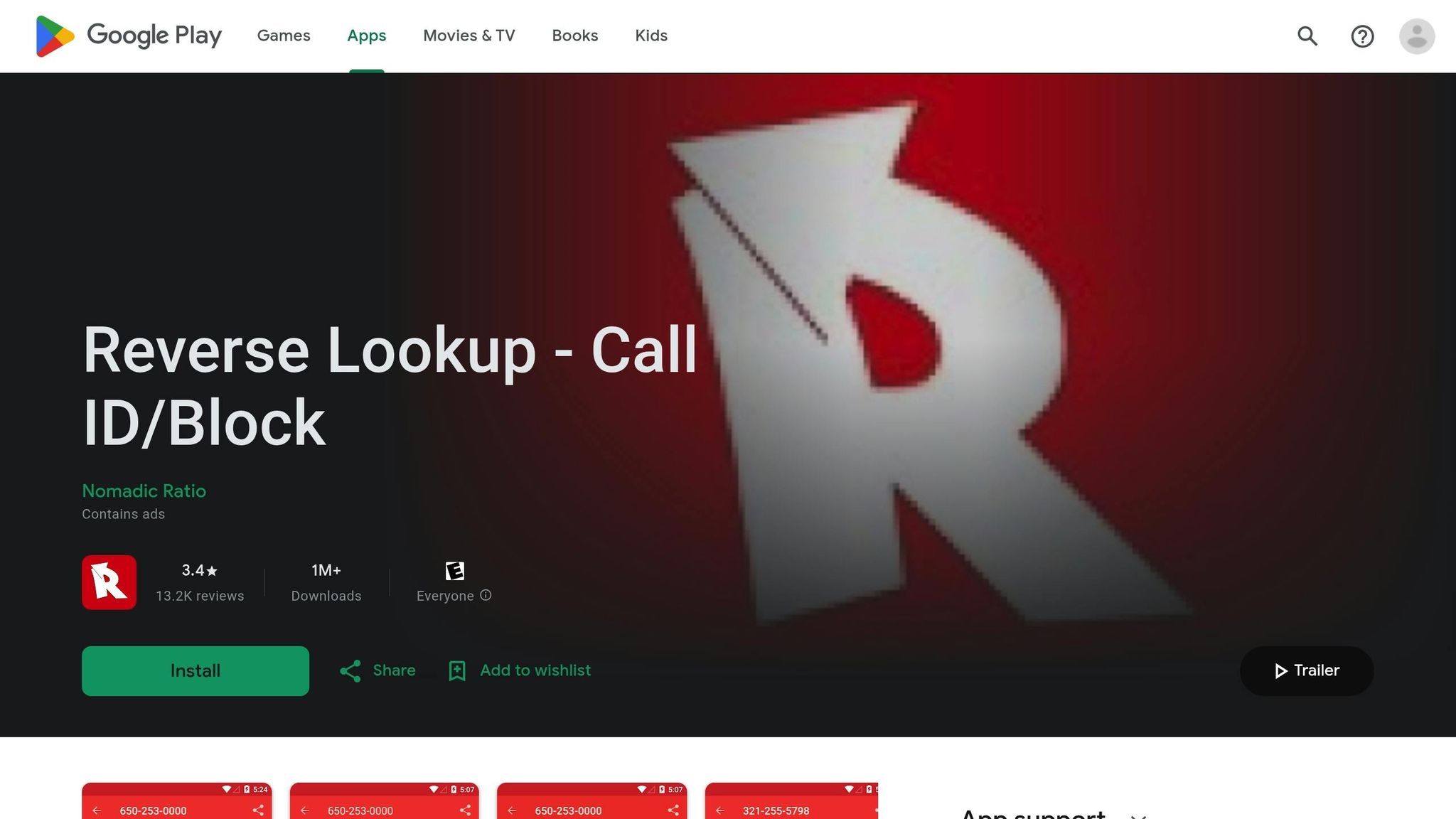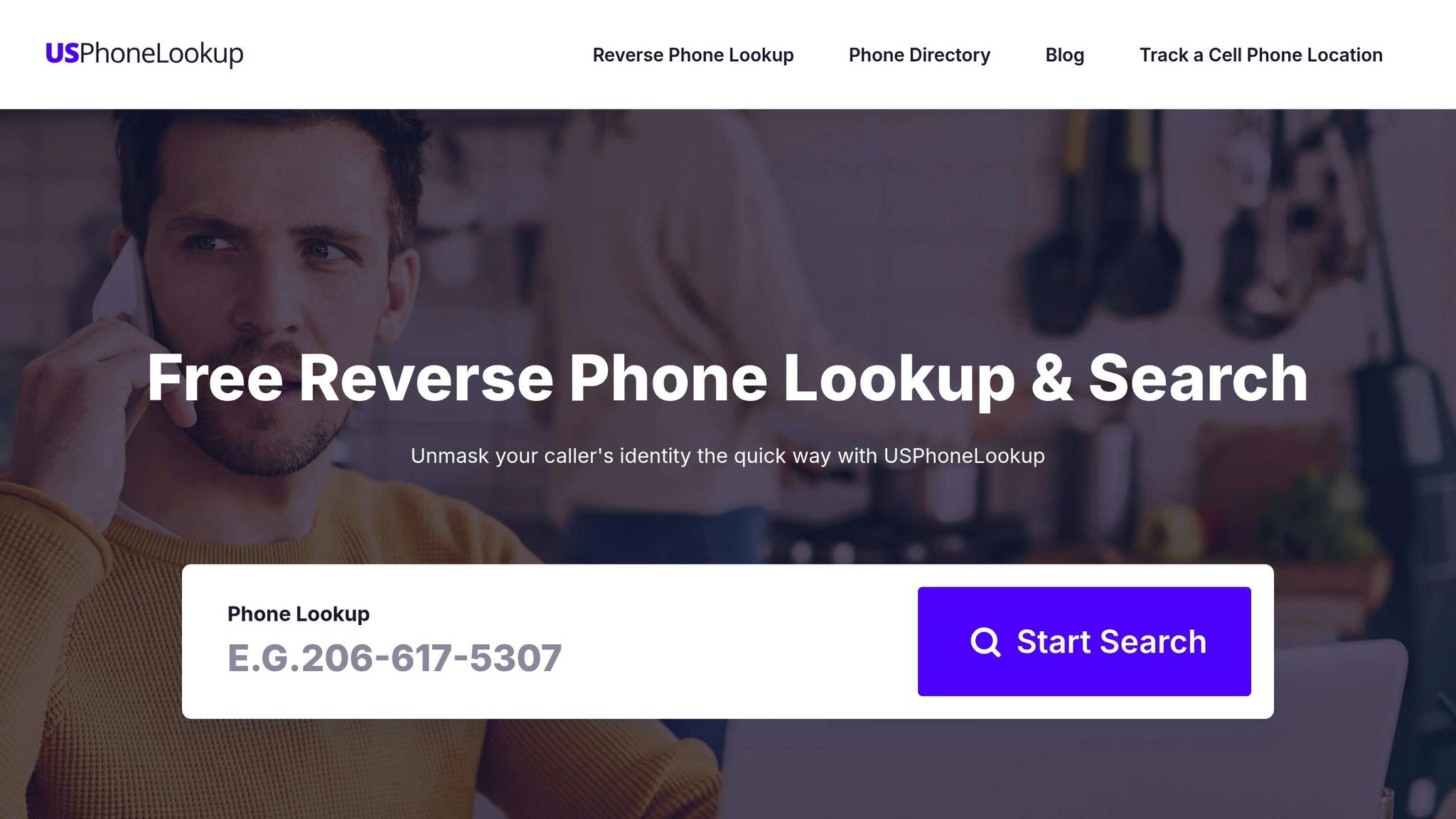5 Best Free Reverse Phone Lookup Methods You Can Use
Reverse phone lookup tools help you identify unknown callers, verify numbers, and improve contact lists - essential for sales and marketing teams. Here are five free methods that work:
- Truecaller: Identifies unknown numbers, flags spam, and syncs with your contact list. Best for quick caller verification.
- Reverse Lookup App: A simple mobile app for basic number lookups. Works well for occasional checks.
- Whitepages: Offers detailed information like names, addresses, and carrier details. Ideal for U.S.-based searches.
- USPhoneLookup: Previously popular but now suspended.
- Social Media & Web Searches: Use Google, LinkedIn, or Facebook to find publicly available phone number details.
Each method has its strengths, from identifying spam to enriching databases. For best results, combine tools based on your specific needs.
Quick Comparison
| Tool | Free Features | Best For | Limitations |
|---|---|---|---|
| Truecaller | Caller ID, spam warnings | Verifying leads, spam detection | Limited data for some regions |
| Reverse Lookup App | Basic lookups | Quick, on-the-go checks | Limited to occasional searches |
| Whitepages | Names, addresses, carrier info | U.S.-focused detailed searches | Limited mobile number info |
| USPhoneLookup | N/A (service suspended) | N/A | No longer functional |
| Social Media/Google | Publicly available data | Researching business contacts | Accuracy depends on data sources |
Use these tools to streamline your process and improve your outreach efforts.
1. Truecaller

Truecaller is a reverse phone lookup tool that proves handy for B2B professionals. Its free version enables users to identify unknown callers and verify phone numbers, making it a useful resource for sales teams and other business applications.
Free Features Offered
The free version of Truecaller provides several helpful features. Users can identify unknown numbers, see real-time caller IDs, and receive spam warnings to avoid unwanted interruptions. The platform also includes basic contact enhancement tools, which can uncover additional details like social media profiles and alternative contact methods when available.
One standout feature is its crowd-sourced spam detection system, which flags suspicious or fraudulent calls. This is especially useful for sales teams trying to separate genuine leads from spam or scams.
Accuracy of Information
Truecaller relies on a crowd-sourced model to verify phone numbers, and its effectiveness often depends on regional activity and the number of registered users. Mobile numbers and frequently used landlines tend to yield more reliable results, especially for businesses that openly share their contact information.
Ease of Use
Truecaller is available on both mobile and desktop platforms, making it adaptable to different work environments. The mobile app automatically identifies incoming calls and offers a straightforward search option for quick lookups. Meanwhile, the web version provides similar features for those working on a desktop.
The platform also integrates well with existing contact lists. It can sync with your current directory and update entries with additional details when matches are found. This saves time by reducing the need for manual updates and individual searches, streamlining the verification process.
Relevance for B2B Applications
For B2B professionals, Truecaller is a valuable tool for verifying leads and improving contact databases. Many sales teams use it to confirm CRM phone numbers and ensure their records are accurate. Its spam detection feature also helps representatives quickly determine whether a prospect is legitimate.
That said, Truecaller works best as a verification tool rather than a primary source for building contact lists. Since some individuals and businesses opt out of data sharing, there may be gaps in its coverage, particularly in specific industries or regions.
2. Reverse Lookup App

The Reverse Lookup App is a mobile tool designed to identify unknown numbers. It provides a straightforward reverse phone lookup service, making it a practical choice for professionals who need to verify caller information quickly while on the move.
Free Features Offered
With the free version, users can perform a limited number of lookups without needing to register. These searches provide basic details, such as the caller's name, and can also flag numbers linked to spam or unwanted calls.
Accuracy of Information
The app pulls its data from public records and telecommunications databases. This often provides reliable details for certain types of numbers, like landlines. However, the accuracy can vary when dealing with mobile numbers. Its reliance on public records forms the backbone of its simple and user-friendly design.
Ease of Use
The app's clean and intuitive interface allows users to enter a number and view results in just a few steps. Its mobile-first design is particularly helpful for sales representatives and remote workers who need to verify numbers while on the go.
Relevance for B2B Applications
For business professionals, the Reverse Lookup App is a handy tool for quick number verification. It helps teams confirm the validity of phone numbers before initiating contact, making outreach efforts more efficient. While it’s not built for large-scale database management, it works well for verifying individual contacts. This makes it a valuable resource for B2B professionals looking to enhance their lead verification process on the fly.
3. Whitepages
Whitepages has long been a go-to reverse phone lookup service in the US, boasting a database of 260 million contacts. It not only matches the features of other tools but also includes verification options that are particularly useful for B2B outreach.
Free Features Offered
With Whitepages, you can enter any 10-digit phone number to instantly uncover details like the owner's name, address, and carrier information - whether it's a wireless, landline, or VoIP number. It also flags potential spam risks. A standout feature is the free carrier search, which identifies the type of number and its last known provider, such as Verizon or AT&T. Plus, the platform offers phone number activity verification, helping users determine if a number is still active or has likely been disconnected - saving time before making a call. Spam detection is another handy tool, instantly identifying spam risks and caller types.
For added convenience, Whitepages has a free mobile app available for both iOS and Android. The app allows users to identify unknown callers and detect spam while on the move.
Accuracy of Information
The free tools provide useful insights, but their accuracy depends heavily on publicly available data. While Whitepages is reliable for identifying landlines and business numbers, information on mobile numbers can be limited unless you upgrade to a paid plan.
Ease of Use
Whitepages keeps things simple. All you need is the phone number - no technical know-how or account setup required. The mobile app carries over this user-friendly approach, making it easy for professionals to verify numbers anytime, anywhere.
Relevance for B2B Applications
For business users, Whitepages is a practical tool for finding contact details of local businesses and professionals across the US. Sales and marketing teams, for instance, can search for prospects' phone numbers by entering a name and location. The active number verification feature ensures teams avoid wasting efforts on disconnected numbers. Additionally, it provides access to publicly available data like addresses, age, and even professional licenses, helping businesses enrich their contact databases.
While the free version covers the basics, businesses requiring more in-depth searches can explore Whitepages' paid plans. These range from $9.99 per month for 20 lookups to $199.99 per month for 1,000 lookups. However, user reviews are mixed. With a Trustpilot rating of 1.6 out of 5 stars from over 83 reviews, opinions vary - some users commend the data quality, while others express concerns about pricing and privacy policies.
4. USPhoneLookup

USPhoneLookup was once a go-to platform for reverse phone lookups, operating through uslookup.online. However, as of October 16, 2025, the service has been suspended. With its operations halted, the tool is no longer an option for B2B professionals who rely on reverse phone lookups to verify leads or build contact databases.
Relevance for B2B Applications
The suspension of USPhoneLookup has rendered it obsolete for businesses that require consistent access to reverse phone lookup services. For former users, this disruption highlights the importance of having alternative tools in place. Reliable platforms like Whitepages and Truecaller, known for their consistent availability, stand out as dependable options for professionals navigating this gap.
Accuracy of Information
Since USPhoneLookup is no longer functional, its ability to provide accurate or updated information is now irrelevant. Without active operations, it cannot contribute to any verification process.
Ease of Use
With the service completely suspended, USPhoneLookup no longer offers any interface or functionality. This serves as a reminder of the risks involved in depending on tools with uncertain reliability.
The suspension of USPhoneLookup underscores the importance of choosing tools with a proven track record of reliability and uptime. Established platforms can help ensure that your reverse phone lookup needs are met without interruptions.
5. Social Media and Web Search Engines
Social media platforms and Google provide an easy way to perform reverse phone lookups without needing specialized tools. By tapping into publicly available online information, this approach is particularly handy for B2B professionals verifying contact details or researching potential leads.
Ease of Use
Using search engines for reverse phone lookups is simple. Just type the phone number in quotes (e.g., "555-123-4567") into Google to find exact matches across websites, directories, and profiles. To narrow down results, you can combine the number with relevant business keywords.
Social media platforms like LinkedIn, Facebook, and Twitter also support phone number searches. LinkedIn stands out for B2B purposes since many professionals include contact details on their profiles or company pages. This straightforward method can save time when verifying business contacts.
Relevance for B2B Applications
Like dedicated lookup tools, these methods help B2B professionals confirm contact details efficiently. They're especially useful for identifying business phone numbers listed on company websites, contact pages, or professional profiles. For instance, searching phrases like "contact us [company name]" or "XYZ's support contact number" often yields reliable results.
Toll-free numbers are another strong lead, as businesses typically make these accessible for customers. Additionally, this approach can uncover extra information about a company, such as recent news mentions or business directory listings, offering more context for B2B research.
Accuracy of Information
Search engines and social media rely on publicly listed phone numbers from websites, blogs, directories, or job profiles. The accuracy of the results depends on how current and updated the sources are. Cross-referencing multiple platforms is key to ensuring reliability. For example, if a phone number appears consistently across a company’s official site, LinkedIn page, and other directories, it’s likely accurate. However, watch out for outdated information from abandoned websites or old social media posts.
Free Features Offered
One of the biggest advantages of using search engines and social platforms is their cost-effectiveness. Google allows unlimited searches without requiring an account, while social media platforms might need a free account for basic search functionality. Their expansive reach can reveal phone numbers and additional details that specialized reverse lookup tools might overlook.
This method works well as a free supplement to dedicated tools, providing extra data at no cost.
Conclusion
Choosing the right reverse phone lookup method depends on what your business needs most. Each tool has its strengths, and how you use them can make all the difference.
Truecaller is ideal if you’re looking for a quick way to identify incoming calls and block spam. Its crowdsourced database is particularly effective at spotting telemarketers and robocallers.
Reverse Lookup App offers a reliable, straightforward option for occasional lookups. It’s a solid choice when you need basic verification without diving into extensive contact details, providing more accuracy than a simple Google search.
Whitepages stands out as the top choice for detailed contact information in the United States. Whether you’re verifying business addresses, uncovering associated names, or conducting in-depth B2B research, Whitepages provides one of the most comprehensive free datasets available.
USPhoneLookup is currently suspended, so you’ll need to rely on other tools for now.
Social media and web search engines are incredibly versatile. They often uncover details that dedicated lookup tools might miss, making them especially useful for researching business contacts. Combining platforms like LinkedIn with company websites can give you a more complete picture. This multi-tool approach is particularly effective for balancing quick checks with deeper research.
A smart strategy might involve combining methods: start with a Google search, verify details with Whitepages, and use Truecaller to screen incoming calls.
Budget and volume also matter. While all these tools offer free options, businesses handling a high volume of lookups might benefit from investing in paid plans on platforms like Whitepages. For those needing advanced B2B contact verification and lead generation, professional tools like Leadsforge could be worth exploring.
Ultimately, the key is to match the tool to your workflow. Sales teams making cold calls may prioritize Truecaller for its spam detection, while marketing teams building contact lists might lean on Whitepages and social media research for more thorough data. By aligning your choice with your specific needs, you can streamline your process, improve lead generation, and boost engagement.
FAQs
What’s the best way to combine reverse phone lookup methods for more accurate contact verification?
To achieve the most precise results, it's smart to combine different reverse phone lookup methods. Start with a people search tool to gather basic details about the phone number, such as the owner’s name or location. Next, verify and expand on this information by using a reverse phone lookup service, which can reveal extra details like email addresses or social media profiles.
This multi-step approach ensures your contact information is accurate and current - an essential advantage for sales and marketing teams aiming to improve their outreach. By leveraging multiple tools, you reduce the chance of errors and gain a more comprehensive understanding of your leads or prospects.
What are the drawbacks of using free reverse phone lookup tools, and when should a business consider paying for a service?
Free reverse phone lookup tools usually provide only the basics - things like the phone number's general location, carrier, or area code. While helpful for quick checks, they often come with limitations, such as daily lookup caps or restricted access to more detailed information.
On the other hand, paid services open the door to far more detailed data. These might include linked email addresses, social media profiles, and even background details. For businesses, investing in a paid tool can make a big difference when accuracy and depth are critical. Whether it's for lead generation, verifying customer details, or preventing fraud, paid options offer the kind of insights that help build stronger contact databases and improve outreach efforts.
How effective are social media and search engines for reverse phone lookups, and what steps can improve accuracy?
Social media platforms and search engines can help with reverse phone lookups, but their usefulness depends on how much accurate public information is available. These tools typically gather data from online directories, public records, and user-generated content, which can sometimes be outdated or incomplete.
To get better results, it's a good idea to cross-check information from several sources. Keep in mind that free tools often provide limited details, especially when it comes to mobile numbers, due to privacy restrictions. For more in-depth and reliable information, you might want to explore paid services designed for reverse phone lookups. These services are often more thorough and better suited for business purposes.
